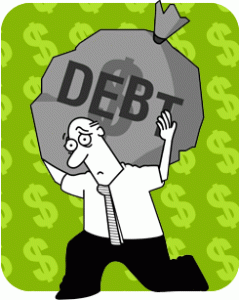Should You Walk Away From Crushing Debt?
 Monday, July 2, 2012 at 7:29AM
Monday, July 2, 2012 at 7:29AM  Post a Comment
Post a Comment Should you walk Away from Crushing Debt? I talk to women in business every week about money and where they are at with debt and I feel their pain. While I was speaking in front of a group of small business owners a couple weeks ago about the mistakes women make with money an older woman, I'll call Joan, had tears running down her face. Joan got up to leave quickly after I finished and I walked out with her. Over 60, no income to speak of, debt she can't pay, overwhelming bills, but is still trying to pay what she can, has a house mortgage that's upside down, and doesn't know what to do. I recommended she talk to a bankruptcy attorney. She had and didn't have the money to pay the attorney. I also suggested she ask her friends for contributions of whatever they can afford to help her with towards the attorney's fees of about $1200.00. And, I offered the first amount. Shame and guilt keep us from asking for help. We have to forgive ourselves and get over that because we do need help at times.
house mortgage that's upside down, and doesn't know what to do. I recommended she talk to a bankruptcy attorney. She had and didn't have the money to pay the attorney. I also suggested she ask her friends for contributions of whatever they can afford to help her with towards the attorney's fees of about $1200.00. And, I offered the first amount. Shame and guilt keep us from asking for help. We have to forgive ourselves and get over that because we do need help at times.
Here's another alternative by Nicholas Carroll who wrote "Walk Away From Debt for a Better Future," and writes for The Huffington Post. He has a little different take on why people SHOULD walk away from debt. He says, "it is the responsibility of local business owners, business managers, and the self-employed to support their employees and 9-to-5 friends in walking away from crushing debt and keep the money in the community. Mr. Carroll says when we pay on debt the money leaves our communities, but when we stop paying and then use that money in our local communities, it benefits our area, not Wall Street. Carroll goes on to say that we can't look to Washington, D.C. for help and many company employees want to do the RIGHT thing and pay their bills, but are drowning in debt.
If you know how to set up budgets and look at the big financial picture, sit down with your friends or employees and help them figure out where they are - the total debt owed, the amount of the loan mortgage, interest and payments (if the house is over 100K upside down), credit card total debt, and really consider what the payment is, whether you can afford the payment and how long it will take for the value of the house to catch up). If necessary contact a bankruptcy attorney who can walk you through the process to decide if bankruptcy is the right choice.
Do you think Mr. Carroll has a good point that morality has kept many good people from walking away from debt at their expense, rather than Wall Street's? He says the new moralty is to support friends to walk away from crushing debt and in doing so support our communities to keep money flowing.
 Lynn Telford-Sahl tagged
Lynn Telford-Sahl tagged  Huffington Post,
Huffington Post,  Nicholas Carroll,
Nicholas Carroll,  Walk Away From Debt for a Better Future,
Walk Away From Debt for a Better Future,  bankruptcy help,
bankruptcy help,  crushing debt,
crushing debt,  walking away from crushing debt,
walking away from crushing debt,  what to do with crushing debt
what to do with crushing debt









